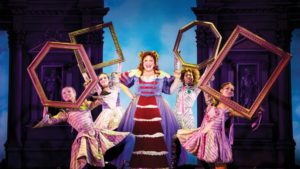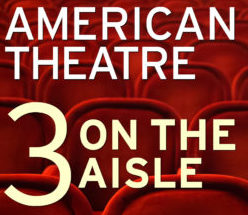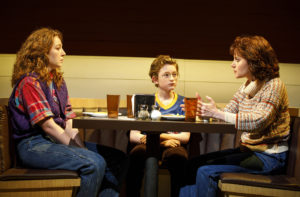 “By calling him humourless I mean to impugn his seriousness, categorically: such a man must rig up his probity ex nihilo.”
“By calling him humourless I mean to impugn his seriousness, categorically: such a man must rig up his probity ex nihilo.”
Martin Amis, Experience
Terry Teachout on the arts in New York City
In today’s Wall Street Journal I review two Broadway premieres, Straight White Men and Head Over Heels. Here’s an excerpt.
* * *
 Progressive identity politics has now made it to Broadway with—literally—a vengeance. The occasion is Second Stage Theater’s new production of “Straight White Men,” a 2014 satire about straight white men and their discontents written by Young Jean Lee, who now becomes the first Asian-American woman to have a play produced on the Great White Way. Not only has it already had successful runs at the Public Theater and Chicago’s Steppenwolf Theatre Company, but the cast includes a movie star-in-the-making, Armie Hammer (“Call Me by Your Name”). Whether “Straight White Men” would have reached Broadway without Mr. Hammer is a moot point, but it’s there now, and the box office is doing brisk business. Unfortunately, the play isn’t any good, though that won’t matter, since it fulfills the first condition of success on Broadway: It tells the members of the audience what they want to hear, and nothing else….
Progressive identity politics has now made it to Broadway with—literally—a vengeance. The occasion is Second Stage Theater’s new production of “Straight White Men,” a 2014 satire about straight white men and their discontents written by Young Jean Lee, who now becomes the first Asian-American woman to have a play produced on the Great White Way. Not only has it already had successful runs at the Public Theater and Chicago’s Steppenwolf Theatre Company, but the cast includes a movie star-in-the-making, Armie Hammer (“Call Me by Your Name”). Whether “Straight White Men” would have reached Broadway without Mr. Hammer is a moot point, but it’s there now, and the box office is doing brisk business. Unfortunately, the play isn’t any good, though that won’t matter, since it fulfills the first condition of success on Broadway: It tells the members of the audience what they want to hear, and nothing else….
Ms. Lee may not have heard, but liberal New Yorkers who go to the theater like nothing more than to be flagellated therein for their sins. “Straight White Men” endeavors to sock it to them, presenting us with a baby boomer (Stephen Payne) and his three impeccably progressive sons (Josh Charles, Mr. Hammer and Paul Schneider), all of whom sincerely believe they’re doing their best to check their collective privilege (“Matt got the drama teacher fired for only casting white people in ‘Oklahoma!’”). Not so: It becomes clear no more than 30 seconds into the play that they are still clinging by their fingernails to the immature manners and mores of their benighted class….
“Straight White Men” plays like a 10-minute “Saturday Night Live” sketch blown out to an hour and a half: The jokes have no bite, and once Ms. Lee finishes shooting the fish in her tiny barrel, she has nothing left to do but shoot them again….
 Yet another comic exercise in applied identity politics is playing one block east of “Straight White Men”: “Head Over Heels” is a jukebox musical whose score consists of songs recorded by the Go-Go’s, an all-female new-wave power-pop group that had a brief vogue in the Eighties. Very freely adapted by Jeff Whitty from “The Arcadia,” Philip Sidney’s 16th-century pastoral romance about mistaken gender identity, it’s been extensively reworked by James Magruder since its original 2015 Oregon Shakespeare Festival run, to no more than modest effect. The book is still a sophomoric mess, and the 17 songs, which are mostly either fast or rather less so, are lively but unvaried….
Yet another comic exercise in applied identity politics is playing one block east of “Straight White Men”: “Head Over Heels” is a jukebox musical whose score consists of songs recorded by the Go-Go’s, an all-female new-wave power-pop group that had a brief vogue in the Eighties. Very freely adapted by Jeff Whitty from “The Arcadia,” Philip Sidney’s 16th-century pastoral romance about mistaken gender identity, it’s been extensively reworked by James Magruder since its original 2015 Oregon Shakespeare Festival run, to no more than modest effect. The book is still a sophomoric mess, and the 17 songs, which are mostly either fast or rather less so, are lively but unvaried….
* * *
Read the whole thing here.
The trailer for Straight White Men:
The trailer for Head Over Heels:
 The sixteenth episode of Three on the Aisle, the twice-monthly podcast in which Peter Marks, Elisabeth Vincentelli, and I talk about theater in America, is now available on line for listening or downloading. In this episode, Peter, Elisabeth, and I take calls from and respond to e-mail from our listeners.
The sixteenth episode of Three on the Aisle, the twice-monthly podcast in which Peter Marks, Elisabeth Vincentelli, and I talk about theater in America, is now available on line for listening or downloading. In this episode, Peter, Elisabeth, and I take calls from and respond to e-mail from our listeners.
Here’s an excerpt from American Theatre’s “official” summary of the proceedings:
The critics are back after a busy July…to discuss the recent layoffs at the New York Daily News that cut 93 employees, including theatre critic and colleague Joe Dziemianowicz. His dismissal is just the most recent in a troubling series of critical layoffs at major publications, including Kris Vire from Time Out Chicago, leading to a discussion on the future of arts criticism and what can be done to save it.
Then, on a lighter note, the critics read your emails and take your calls; answering questions on everything from what they believe the role of politics in criticism should be, to whether they actually enjoy sitting on the aisle for shows….
As usual, we wrap things up with a discussion of recent productions, in New York and elsewhere, that we’ve seen and liked—or not.
To listen, download the latest episode, read more about it, or subscribe to Three on the Aisle, go here.
In case you missed any previous episodes, you’ll find them all here.
 The original Playhouse 90 TV version of J.P. Miller’s Days of Wine and Roses, directed by John Frankenheimer and starring Cliff Robertson, Piper Laurie, and Charles Bickford. This performance was telecast live (with videotaped inserts) by CBS on October 2, 1958:
The original Playhouse 90 TV version of J.P. Miller’s Days of Wine and Roses, directed by John Frankenheimer and starring Cliff Robertson, Piper Laurie, and Charles Bickford. This performance was telecast live (with videotaped inserts) by CBS on October 2, 1958:
(This is the latest in a series of arts- and history-related videos that appear in this space each Monday, Wednesday, and Friday)
 Here’s my list of recommended Broadway, off-Broadway, and out-of-town shows, updated weekly. In all cases, I gave these shows favorable reviews (if sometimes qualifiedly so) in The Wall Street Journal when they opened. For more information, click on the title.
Here’s my list of recommended Broadway, off-Broadway, and out-of-town shows, updated weekly. In all cases, I gave these shows favorable reviews (if sometimes qualifiedly so) in The Wall Street Journal when they opened. For more information, click on the title.
BROADWAY:
• The Band’s Visit (musical, PG-13, all shows sold out last week, reviewed here)
• Dear Evan Hansen (musical, PG-13, all shows sold out last week, reviewed here)
• Hamilton (musical, PG-13, Broadway transfer of off-Broadway production, all shows sold out last week, reviewed here)
• My Fair Lady (musical, G, all shows sold out last week, reviewed here)
OFF BROADWAY:
• On a Clear Day You Can See Forever (musical, G, too complex for children, closes Sept. 6, reviewed here)
• Symphonie Fantastique (abstract underwater puppet show, G, closes Sept. 2, reviewed here)
IN GARRISON, N.Y.:
• Richard II (Shakespeare, PG-13, closes Aug. 26, reviewed here)
• The Taming of the Shrew (Shakespeare, PG-13, closes Aug. 24, reviewed here)
CLOSING SOON OFF BROADWAY:
• Carmen Jones (musical, PG-13, closes Aug. 19, reviewed here)
• Mary Page Marlowe (drama, PG-13, extended through Aug. 19, reviewed here)
CLOSING NEXT WEEK IN NEW HOPE, PA.:
• 42nd Street (musical, G, closes Aug. 4, reviewed here)
 Arthur Rubinstein, André Previn, and the London Symphony perform Saint-Saëns’ Second Piano Concerto in G Minor, Op. 22. This performance was taped at Fairfield Hall, Croydon, England, in 1975, when Rubinstein was eighty-eight years old. Saint-Saëns heard him play the concerto in Paris in 1904:
Arthur Rubinstein, André Previn, and the London Symphony perform Saint-Saëns’ Second Piano Concerto in G Minor, Op. 22. This performance was taped at Fairfield Hall, Croydon, England, in 1975, when Rubinstein was eighty-eight years old. Saint-Saëns heard him play the concerto in Paris in 1904:
(This is the latest in a series of arts- and history-related videos that appear in this space each Monday, Wednesday, and Friday)
| M | T | W | T | F | S | S |
|---|---|---|---|---|---|---|
| 1 | 2 | |||||
| 3 | 4 | 5 | 6 | 7 | 8 | 9 |
| 10 | 11 | 12 | 13 | 14 | 15 | 16 |
| 17 | 18 | 19 | 20 | 21 | 22 | 23 |
| 24 | 25 | 26 | 27 | 28 | ||
An ArtsJournal Blog